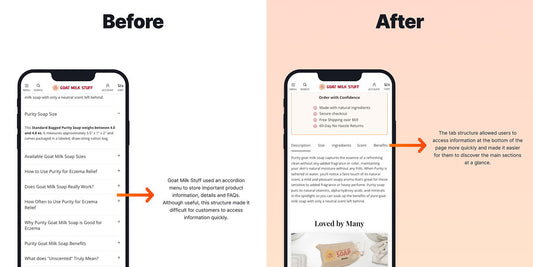Table of Contents
Get useful eCommerce stuff
Shopify and Etsy are both excellent eCommerce platforms, and each serves a slightly different market and target audience. If your products suit these varying audiences, you may want to use both platforms together. Fortunately, Shopify allows you to integrate your stores, so that you can manage your products and more from one platform, ensuring there is no awkward overlap.
Whether you started on Etsy and now want to add Shopify to your eCommerce efforts or want to trade on both platforms simultaneously to optimise your sales, integration is the way to go. Keep reading to find out how to integrate and use both platforms together.
What Are the Benefits of Selling on Shopify and Etsy?
In the vast realm of eCommerce, Shopify and Etsy both stand out as formidable platforms, each offering unique advantages to sellers. Let's discuss the benefits of each.
Benefits of Shopify
- Unparalleled Customisation: Shopify empowers sellers with unmatched customisation options. Tailor your store to perfection, from the storefront design to the checkout processes, and ensure that your brand is consistently represented throughout the customer journey.
- Scalability: As your business grows, so can your Shopify store. The platform is designed to handle businesses of all sizes, offering scalability that evolves with your entrepreneurial journey.
- Diverse Sales Channels: Expand your reach beyond the basics. Shopify enables you to sell not only through your online store but also through social media, marketplaces, and even in-person with its POS system.
Benefits of Etsy
- Built-In Audience: Etsy is a bustling marketplace with millions of active buyers, providing a ready-made audience for your products. This built-in traffic can give your products immediate exposure.
- Simple Setup: For those just starting, Etsy's straightforward setup is a blessing. You can quickly list your products without the complexities of building an entire online store, making it an ideal entry point for artisans and small businesses.
- Community and Brand Exposure: Etsy is not just a platform; it's a community. You can engage with like-minded sellers and tap into a network that can amplify your brand exposure. The collaborative spirit on Etsy can foster brand loyalty among customers.
Choosing between Shopify and Etsy ultimately depends on your business goals and preferences. While Shopify offers a canvas for complete brand control and expansion, Etsy provides a bustling marketplace that caters to the handmade and unique. For a dynamic strategy, consider the synergy of leveraging both platforms – Shopify and Etsy – to maximize your reach and impact in the e-commerce landscape.
Does Shopify Integrate with Etsy?
Yes, fortunately, Shopify does integrate with Etsy. There are three main ways to do this. Here are your options for connecting Etsy with Shopify:
- Coding the APIs (application programming interface): This is one of the trickier options, as coding your own integration generally requires programming knowledge and experience.
- Third-party agencies: If you have the budget to use a third party agency, these experts can help you to not only integrate but to set up and optimise your store.
- Native marketplace integrations: Both Shopify and Etsy have features and apps directly available on their marketplaces that will allow you to integrate.
Shopify or Etsy
Trying to decide between these two marketplaces? If you would prefer to use only one platform, you need to consider the different markets for each.
Etsy is a platform that supports creative and handmade goods. It has a very active community of buyers and sellers and is a great choice for those entering the eCommerce world.
Shopify is a large-scale, popular eCommerce platform. It has a lot of features and opportunities and is a great choice for marketing strategies that intend to scale. It is used in 175 countries, spans across 21 languages, and is used by major corporations like Nestle and Kylie Cosmetics.
Why Shopify and Etsy is Better Together
Clearly, these two platforms serve rather varying markets, and one may suit you better than the other. However, having both allows you to tap into both markets, and allows you access to different kinds of consumers that possibly do not overlap with one another.
Using the two platforms together also allows you to use the features and advantages of both so that you do not need to settle for one. This can also allow you to test both platforms, in order to inform a decision to pull focus to one platform in the future.
It is also important to keep in mind that both platforms do have cons. When they are connected, the cons of one platform can be mitigated by a pro on the other.
Etsy Shopify Inventory Management
Integrating your stores allows you to manage inventory automatically. Through the methods mentioned above, you can automate the syncing of your inventory and listings, without any technical hassle.
The ease of use is one of the major reasons why it is worth integrating your stores.
Link Shopify to Etsy
In order to link Shopify to your Etsy store, you need to have product listings on Etsy already. You can then go onto Shopify and download the Etsy Marketplace Integration app.
On the app’s homepage, navigate to the text block titled “Connect with Etsy.” Enter your Etsy store name and press Enter. On the following page, click “Allow Access.” And with that, your Shopify store will be integrated with Etsy.
Is Etsy Your Solution, or Is Shopify Traffic the Real Issue?
If you're exploring the Shopify-Etsy integration, it might be because your Shopify store isn't converting traffic into sales as effectively as you'd like. But before you shift to another platform, consider whether the real issue lies with your Shopify conversion rate.
At Blend Commerce, we specialise in helping Shopify merchants improve their conversion rates. Through our detailed CRO Audit, we identify key opportunities to enhance your store's performance - boosting conversion rates and maximising the value of your existing traffic. From user experience improvements to optimising your site's structure and checkout flow, our audit uncovers data-driven insights that can transform your Shopify store's results.
Don't lose potential sales by redirecting traffic to another platform - let's focus on converting the traffic you already have. Discover how our CRO Audit can help to unlock your Shopify store's potential today.








